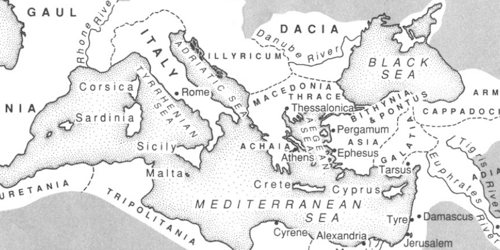I want to take you back to a recent evening in our lives that marked an ending for us, and a beginning. I want to take you there so I can ask you a question that was asked about us that night.
The night was January 15th. On that night we marked the end of almost 14 years of ministry at Richview Baptist Church in Toronto. We had one of our two kids while we were there. We had spent some of the best years of our lives while I pastored at Richview. On that evening we were saying goodbye to our church family. My library was in storage. I remember very clearly the feeling of leaving the keys on my desk and closing the door to my study for the very last time, knowing that the next morning I’d begin work on converting a room in my basement into my new study.
That evening, someone who loves us and who has appreciated our ministry asked an question about our plans to leave Richview and to begin a church plant. The question was asked quietly: Does Toronto really need another church? Another way of putting the question is this: Why bother with church planting when Toronto already has so many churches already?
It’s a great question. In fact, it’s a question that I’ve asked many times in the past as well. Toronto has so many churches that are plateaued or in decline. Why start a new church? Why not put a moratorium on church planting and just focus on revitalizing existing churches? Does Toronto really need a new church? It’s a great question, and there’s a great answer as well.
In the passage we have before us this morning, the apostle Paul is concluding his letter to the Roman church. His letter is one of the high points of theological insight within Scripture. As he gets to the end of his book, he tips his hand about the reason that he’s writing. After all, he didn’t start the church in Rome and he had never visited it. Paul gives the answer in this passage. In Romans 15:14-16 he says that he wants to remind them of what they already know, because he’s an apostle to the Gentiles, and they’re a predominantly Gentile church.
But then he begins talking about his church planting ministry. In this passage Paul gives us three reasons why church planting is so important. So this morning I want to simply do what Paul does in this passage. Let me give you three reasons why church planting is important, and then let me do what Paul does as well. Let me challenge you to see how you can play a role.
So let’s look at three reasons why we need to plant churches. And then let me tell you how you can be involved in one of the greatest ministries that we have before us at this time.
Why plant churches?
One: Plant churches as an act of worship.
Look at verses 14 to 16 with me:
I myself am satisfied about you, my brothers, that you yourselves are full of goodness, filled with all knowledge and able to instruct one another. But on some points I have written to you very boldly by way of reminder, because of the grace given me by God to be a minister of Christ Jesus to the Gentiles in the priestly service of the gospel of God, so that the offering of the Gentiles may be acceptable, sanctified by the Holy Spirit. (Romans 15:14-16)
There are many ways that you can think of church planting. Close your eyes and picture what comes to your mind when you think of a church planter. Here’s what I think of: a 20-something young guy with an edge and a Mac computer who likes to blog and hang out at coffee shops. That’s the image that many people have of a church planter. Or maybe you think of church planters that you know. I think of guys like my church planting friends Dan, Joe, Paul, and Tim. I don’t know what image you have of a church planter, but I will bet it’s not the image that Paul gives us here.
Here’s the image that Paul gives us. He gives us the image of a Jewish priest offering a sacrifice to God. But the priest isn’t offering an animal sacrifice or using a knife. Instead, Paul gives us a shocking image. He pictures the church planter as a priest using the gospel as the tool, and the new Gentile believers as the offering. Remember that Gentiles were forbidden to enter the temple. But here Gentiles are in the temple, and they’re being offered as an acceptable sacrifice because they have been made holy by the Holy Spirit. It’s a jarring image, and it’s worth chewing on for a long time I think.
Why plant churches? The first reason Paul gives us is a doxological one. We plant churches as an act of worship to God. We plant churches because we want to fulfill our priestly ministry of offering to God people who were far away from him, but who have been sanctified by the Holy Spirit and who are now acceptable sacrifices of worship to him. Church planting is an act of worship. It’s like what John Piper said, if I could adapt what he’s said:
[Church planting] is not the ultimate goal of the Church. Worship is. [Church planting] exists because worship doesn’t. Worship is ultimate, not [church planting], because God is ultimate, not man. When this age is over, and the countless millions of the redeemed fall on their faces before the throne of God, [church planting] will be no more. It is a temporary necessity. But worship abides forever.
Worship, therefore, is the fuel and goal of [church planting]. It’s the goal of [church planting] because in [church planting] we simply aim to bring the nations into the white hot enjoyment of God’s glory. The goal of [church planting] is the gladness of the peoples in the greatness of God. “The Lord reigns; let the earth rejoice; let the many coastlands be glad!” (Ps 97:1). “Let the peoples praise thee, O God; let all the peoples praise thee! Let the nations be glad and sing for joy!” (Ps 67:3-4).
But worship is also the fuel of [church planting]. Passion for God in worship precedes the offer of God in preaching. You can’t commend what you don’t cherish. Missionaries will never call out, “Let the nations be glad!” who cannot say from the heart, “I rejoice in the Lord…I will be glad and exult in thee, I will sing praise to thy name, O Most High” (Ps 104:34, 9:2). [Church planting] begins and ends in worship.
We have our eyes on a neighbourhood in Toronto. And I own a Mac and I’ll probably hang out in coffee shops in that area, and I may even work on my blog. But the image that I have in my mind as I move into that area is that of a priest. I want to go in as a priest in that area and offer God an offering of people who have been transformed by the gospel and the Holy Spirit. That’s the first reason why church planting is so important. It’s an act of worship to God. It’s so that we can offer the sacrifice of transformed lives to God in worship.
But there’s a second reason why we should church plant:
Two: Church planting is strategic.
Read what Paul says in verses 17 to 19:
In Christ Jesus, then, I have reason to be proud of my work for God. For I will not venture to speak of anything except what Christ has accomplished through me to bring the Gentiles to obedience—by word and deed, by the power of signs and wonders, by the power of the Spirit of God—so that from Jerusalem and all the way around to Illyricum I have fulfilled the ministry of the gospel of Christ… (Romans 15:17-19 ESV)
Paul seems a little confident in this passage. We’re not used to hearing somebody talk about being proud of their work for God. And in verse 19 Paul makes an audacious claim: that he’s fulfilled his ministry by planting churches in a circle or arc from Jerusalem all the way to Illyricum. This is a huge area, from Jerusalem all the way to what we would call Albania today. It’s just northeast of Italy. We read later on that Paul is even planning to branch out further to Spain. Paul says that he’s fulfilled his ministry throughout this vast area. How is this even possible? There were only a small number of churches.

Here’s what I think Paul means. He means that churches had been planted in key population centres so that those churches could carry out the work of evangelism themselves. Paul believed that by planting churches in cities, those churches would continue to grow and spread and influence the entire regions surrounding those cities. Paul’s own distinctive ministry of starting foundational and strategic churches had been fulfilled, and the name of Christ would soon be heard throughout its borders. This is exactly what happened. It reminds me of the pioneers. As soon as they were close enough to see the smoke rising from a neighbour’s house, they knew it was time to move on and populate a new area.
Tim Keller puts it this way:
Paul's whole strategy was to plant urban churches. The greatest missionary in history, St.Paul, had a rather simple, two-fold strategy. First, he went into the largest city of the region (cf. Acts 16:9,12), and second, he planted churches in each city (cf. Titus 1:5- "appoint elders in every town"). Once Paul had done that, he could say that he had 'fully preached' the gospel in a region and that he had 'no more work' to do there (cf. Romans 15:19,23). This means Paul had two controlling assumptions: a) that the way to most permanently influence a country was through its chief cities, and b) the way to most permanently influence a city was to plant churches in it. Once he had accomplished this in a city, he moved on. He knew that the rest that needed to happen would follow.
Keller concludes:
The vigorous, continual planting of new congregations is the single most crucial strategy for 1) the numerical growth of the Body of Christ in any city, and 2) the continual corporate renewal and revival of the existing churches in a city. Nothing else--not crusades, outreach programs, para-church ministries, growing mega-churches, congregational consulting, nor church renewal processes--will have the consistent impact of dynamic, extensive church planting.
If you want to see Ontario transformed, here’s what we need to do. We need to go to key urban centres like Toronto and plant churches. They’re like beachheads. It’s the most strategic thing we can do. And those church plants are not only going to have an influence on those cities. Like it or not, what happens in the city influences the entire region as a whole. And if churches are planted in places like Toronto, it’s going to have a strategic influence on a much larger area than we realize.
That’s why we need to church plant. Church planting is an act of worship, but it’s also strategic. It’s so strategic that Paul believed that churches planted in major population centres would be enough to spread the gospel in that entire region. That’s the second reason why church planting is so important.
Church planting is an act of worship. Church planting is strategic. There’s one more reason why church planting is important:
Three: Church planting is evangelistic.
Paul writes:
…and thus I make it my ambition to preach the gospel, not where Christ has already been named, lest I build on someone else's foundation, but as it is written,
“Those who have never been told of him will see,
and those who have never heard will understand.”
(Romans 15:20-21 ESV)

Here’s a map of Toronto that has our current Fellowship churches. Notice that there are entire areas - particularly downtown - where we don’t have any churches. That doesn’t mean that there aren’t churches there. It must means that we don’t have any churches in those areas.
What struck me is that many of these areas are ones that are exploding with growth. The population of Toronto has grown by 9% in the last five years. Condos are springing up all over the place in locations where we just don’t have any churches. Paul said it was his ambition to preach the gospel where it hasn’t been preached. We have this opportunity right in Toronto.
The opportunity we have before us is one that goes back all the way to Isaiah 52:5. Paul quotes it in verse 21:
Those who have never been told of him will see,
and those who have never heard will understand.
Why church plant? Because I have the opportunity of participating in something that started a long time ago. Those who have not yet been told of the Lord must know. People who have never heard the gospel must understand. Church planting is a means of evangelizing areas where Christ is not yet named, and that includes huge parts of Toronto.
Charles Simeon said:
Who that knows the value of his own soul, must not pant after the salvation of the souls of others? And who, that knows his obligations to God, must not long to serve God in a way so acceptable to his mind, and so conducive to his glory? Let me not, then, call you to this work in vain. If there be any who are by education and by grace fitted for personal exertion in that field of labour, let him, like the Prophet, stand forth, and say, “Here am I: send me.” If it be only in a subordinate manner that you are able to assist in this good cause, still let it be seen that your heart is in it, and your labour according to the full extent of your ability. In your contributions, be liberal after your power: and in whatever way you can be useful, “give yourselves to the work” with cheerfulness, and persevere in it with diligence. Certainly, if ever united exertions were called for, it is now, when God is so evidently prospering the work, and putting honour on those who are engaged in it — — — “Come then, all of you, to the help of the Lord:” and “whatever your hand findeth to do, do it with all your might.”
So that, Paul says, is why he’s a church planter. He’s a church planter because church planting is an act of worship. He’s a church planter because church planting is strategic. And he’s a church planter because church planting is evangelistic.
But then Paul does what I have to do as well. Paul enlists the Romans and enlists their help in what he’s doing. He says in verse 24: “I hope to see you in passing as I go to Spain, and to be helped on my journey there by you, once I have enjoyed your company for a while” (Romans 15:24). And he asks them to pray for him as well. Douglas Moo says, “Paul here hints at one of his main purposes in writing Romans: the need to get help from the Romans for his projected Spanish mission.” He wants Rome to be the base of his support for his mission in Rome.
You see, although Paul has planted churches all throughout the Eastern Mediterranean, he’s not done yet. He still wants to go even farther, to far edge of the Mediterranean, and spread the gospel there as well. Paul’s not done planting churches as long as there are still more population centres that need the gospel.
You see, church planting is about more than a church planter. You need people praying. You need bases of support. You need all kinds of people taking all kinds of roles.
I saw this picture recently:

Deck Hands Needed
Live Aboard
Low Pay
Long Hours
Good Food
Permanent Crew Space Available
Opportunity of a Lifetime
It reminded me of the quote from Sir Ernest Shackleton, from the advertisement he used when recruiting men for his expedition to Antarctica in 1914:
Men wanted for hazardous journey. Small wages, bitter cold, long months of complete darkness, constant danger, safe return doubtful. Honour and recognition in case of success.
That’s the adventure of church planting. It’s worth it because it’s an act of worship, and because it’s strategic and evangelistic. And it’s why you should consider partnering in planting churches as well.








